 Smartphones and tablets succeed or sink on the strength of their apps. Over the past few years, this has given Apple ($AAPL) a huge advantage. If you wanted the latest apps, Apple was the only choice. Blackberry ($BB), Microsoft ($MSFT) and even Google ($GOOG) weren't even in the race.
Smartphones and tablets succeed or sink on the strength of their apps. Over the past few years, this has given Apple ($AAPL) a huge advantage. If you wanted the latest apps, Apple was the only choice. Blackberry ($BB), Microsoft ($MSFT) and even Google ($GOOG) weren't even in the race.
Now, though, this is starting to change, and the 2013 class of Big Pharma and biotech apps is a decent barometer of the shift. While biopharma used to introduce apps on Apple devices first and Google's Android later, if at all, the past year has seen the rise of simultaneous launches. Sanofi ($SNY) summed up the new way of working when it spoke of adopting a "device agnostic" app-development strategy.
Recent launches by the French drugmaker--such as heparin-dosing app CLX Dosis--show that this policy is starting to shape its output. Other companies are taking similar approaches, all of them aware that the sheer scale of Android--particularly in emerging markets--makes it impossible to ignore. Apple still has some biopharma exclusives, but the days of this being an obvious decision are coming to an end.
Growth in the numbers of Apple and Android devices has extended the potential reach of biopharma apps, and companies have responded by diversifying their output. As well as adherence, diary and text-based education apps, this year's list features a mutant-cheese-fighting game from Genentech, a glaucoma simulation from Merck ($MRK) and a real-time bus schedule from Biogen Idec ($BIIB).
With biopharma supplementing in-house app initiatives by supporting offerings from other healthcare organizations, the number of new products exceeds the scope of this feature. Even after doubling the size of the 2011 list and combining multiple apps from the same firm into single entries, this piece falls short of being exhaustive. Merck KGaA, Mylan ($MYL) and Teva ($TEVA) are notable absentees. (The 2012 list can be found here.)
Nonetheless, we hope the list gives you a taste of how biopharma approached mobile apps in 2013, which will go down as the last year the industry operated without final FDA guidance. If you know of any great apps we missed--or want to sound off on those we included--please get in touch. -- Nick Paul Taylor (Twitter)
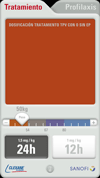 Sanofi's CLX Dosis
Sanofi's CLX Dosis
When Sanofi ($SNY) first began rolling out apps, it did what everyone else did: launch on Apple ($AAPL) devices first. Now, though, the French drugmaker talks of being "device agnostic," and this is evident in its recent release. Apple devices were the first to receive Sanofi's Spanish heparin-dosing app CLX Dosis, but within a few weeks it was available for phones running Google's ($GOOG) Android too.
For Sanofi--and many appmakers--this is the new normal. Glucose-monitoring app iBGStar is being readied for Android, and it seems likely diabetes apps Sanofi is crowdsourcing will stick to the new device-agnostic approach. With Google dominating in low- to middle-income countries that make up a large proportion of the diabetes population, ignoring its devices would mean cutting off a lot of users.
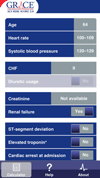 AstraZeneca's GRACE 2.0
AstraZeneca's GRACE 2.0
Big Pharma is looking beyond its boundaries for innovation more than ever, and this is just as true in the app sector as it is in drug development. AstraZeneca ($AZN) is a prime example. Earlier this year, AstraZeneca supported the creation of an app based on the Global Registry of Coronary Events (GRACE). Healthcare providers can use GRACE 2.0 to identify high-risk heart patients.
AstraZeneca also lent its support to the National Health Service's My Medication Passport, which allows patients to track the names, doses and timings of their drugs. The arrangement went beyond just sponsorship of the app, with AstraZeneca also contributing resources and expertise. Both apps arrived on Apple ($AAPL) and Android devices almost simultaneously.
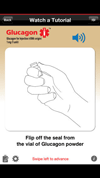 Eli Lilly's MDLinx
Eli Lilly's MDLinx
Eli Lilly ($LLY) maintained its active participation in the world of oncology apps in 2013 by sponsoring the creation of MDLinx, a tool that collates the top news from cancer journals. Users can further cut the risk of information overload by limiting the news they see to specific subspecialties. The company behind MDLinx has previously created an oncology quiz app.
While MDLinx is available on both Apple ($AAPL) and Android devices, Lilly's other notable app took the old approach. The iPhone app shows how to administer Lilly's Glucagon for Injection to Type 1 diabetes sufferers. Lilly has limited the release of the app to the U.S., and this perhaps explains the Apple-centric launch. In the U.S., two in 5 smartphone subscribers use Apple, according to comScore.
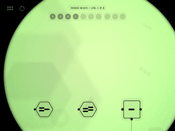 Genentech's Ralph's Killer Muenster
Genentech's Ralph's Killer Muenster
Amid all the very serious, worthy apps in the class of 2013 is something a little different: an iPad game in which players must save San Francisco from mutant cheese. That is the premise of Ralph's Killer Muenster, an app Genentech introduced earlier this year. Beneath the wacky premise is a serious purpose: to get kids interested in science and teach them about DNA and genetics.
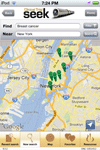 Novartis' Clinical Trial Seek
Novartis' Clinical Trial Seek
Novartis ($NVS) strengthened its oncology app portfolio with two new products for Apple ($AAPL) and Android devices. Clinical Trial Seek is one of many apps to repackage National Institutes of Health data on recruiting studies. Eli Lilly ($LLY), PPD and others have similar offerings. The second app--MyNET Manager--helps patients with neuroendocrine tumors track test results and appointments.
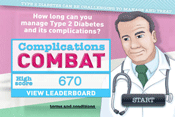 Boehringer Ingelheim's Complications Combat
Boehringer Ingelheim's Complications Combat
Boehringer Ingelheim became the latest firm to try to educate through play in May when it introduced iPad game Complications Combat in conjunction with Eli Lilly ($LLY). Players swipe items that help diabetics to one side of the screen and those that exacerbate the illness to the other. Boehringer also brought its chronic obstructive pulmonary disease patient consultation tools to mobile devices.
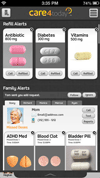 Janssen's Care4Today
Janssen's Care4Today
In August, Johnson & Johnson ($JNJ) subsidiary Janssen released version 2.0 of its health management app, Care4Today. The app can now send alerts to family members when someone doesn't take their medication and produce charts showing adherence to treatment regimens. Janssen donates 5 cents to charity for each day the user is fully adherent to their medications.
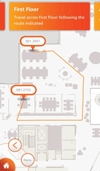 GSK's SiteMap
GSK's SiteMap
Labyrinthine office complexes and corporate campuses are the bane of many a new employee or visitor to a company. This year, GlaxoSmithKline ($GSK) tried to make life a little easier for newcomers to its sites by introducing an iPhone app with maps of its facilities. The app gives Glaxo employees access to internal maps showing the locations of individual desks and how to get around an office.
 Roche's Science Booster
Roche's Science Booster
When Roche ($RHBBY) bought Genentech, observers fretted that Swiss suits would kill the free-wheeling culture at the biotech. Yet, in the year Genentech released a mutant-cheese game, Roche let its hair down too. Science Booster players ride a rollercoaster while collecting items and answering questions about Roche. The player with the highest score wins travel to an international scientific conference.
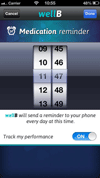 Bristol-Myers Squibb's wellB
Bristol-Myers Squibb's wellB
Bristol-Myers Squibb ($BMY) entered the mobile disease-management sector in July when it added its wellB app to iTunes. The iPhone app is targeted at hepatitis B patients prescribed BMS' Baraclude and includes features such as medication reminders. A small study published in the World Journal of Hepatology last year found that almost half of hepatitis B patients had missed medications in the past.
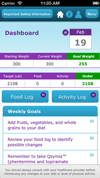 Vivus' Q and Me Support
Vivus' Q and Me Support
Research suggests mobile devices can help with weight loss--and popular apps in the field have racked up millions of downloads--so it makes sense for Vivus ($VVUS) to enter the fray. The biotech created Apple ($AAPL) and Android apps to support people's weight-loss efforts, and, in doing so, provide some positive, indirect exposure for its struggling drug, Qsymia.
The apps have received poor reviews, though, with users criticizing their stability and usability. And Vivus faces competition from huge, well-established apps. The Noom Weight Loss Coach has been installed 5 million to 10 million times on Android devices. Vivus' Q and Me Support is listed in the 1,000 to 5,000 installs category.
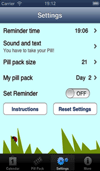 Bayer's My iPill
Bayer's My iPill
Forgetting to take any medication is unwise. But forgetting to take a contraceptive has far-reaching consequences. In December, Bayer made My iPill available on iPhones to help people remember to take their daily contraceptive pills. The app sends personalized reminders at the same, user-defined time every day and works with both 21- and 28-day packs of pills.
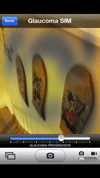 Merck's Glaucoma SIM
Merck's Glaucoma SIM
The importance of early diagnosis to the outcomes of patients with glaucoma has caused many experts to call for routine screening. Yet, when detected in the early, asymptomatic phase, physicians can struggle to convince patients of the need to take their medicines. Adherence is a problem. Recognizing this, Merck ($MRK) has developed iPhone and iPad apps to simulate the visual effects of glaucoma.
Working with The International Glaucoma Association and a British eye hospital, Merck created an app that uses a device's camera and filters to show the impact of glaucoma on vision. A slider allows the user to adjust the severity of the glaucoma, helping physicians to demonstrate the consequences of failing to control the disease. The app also features medical diagrams to further educate patients.
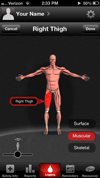 Pfizer's HemMobile
Pfizer's HemMobile
A trawl of old Big Pharma apps uncovers plenty that appear to have been launched and then forgotten, with many never being updated or improved. Pfizer ($PFE) has tried to do better with its HemMobile iPhone, iPad and Android apps, rolling out version 2.0 11 months after the initial launch. The changes, Pfizer claims, were prompted by feedback from the hemophilia community.
The original version Pfizer introduced in October allowed hemophiliacs to photograph, map, and log bleeds to create a healthcare history. Pfizer has tried to improve this process in the updated app, while also adding report capabilities. The app is a way for Pfizer to connect with hemophiliacs. Last year its hemophilia drug, BeneFix, generated sales of $775 million but now faces competition from Baxter ($BAX).
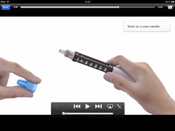 Novo Nordisk's NovoPen 5
Novo Nordisk's NovoPen 5
In the fiercely competitive diabetes market, little improvements that make the patient's life easier can give a company the edge over rivals. At Novo Nordisk ($NVO), this has led to the development of a succession of drug-delivery devices. The most recent--NovoPen 5--has a companion iPad app showing patients how to use the system.
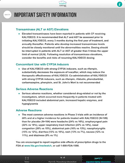 Vertex's Kalydeco
Vertex's Kalydeco
After winning FDA approval for its orphan cystic fibrosis drug Kalydeco last year, Vertex ($VTRX) faced a new challenge--showing physicians why it is a $294,000-a-year treatment. In June, Vertex introduced an iPad app to support its education efforts. The app brings together safety and efficacy data, prescribing information, and a video explaining the science of how the drug works.
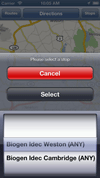 Biogen Idec's BIIB Coach
Biogen Idec's BIIB Coach
Biogen Idec ($BIIB) is trying to take the uncertainty out of waiting for a bus. The BIIB Coach app for Apple ($AAPL) and Android devices gives users real-time predictions of when the bus Biogen provides for employees is expected to arrive at a stop. Biogen also introduced a Spanish-language Tysabri information app and a multiple sclerosis diary for the Danish market.
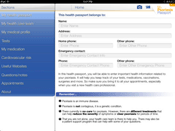 AbbVie's My Psoriasis Passport
AbbVie's My Psoriasis Passport
AbbVie ($ABBV) teamed up with the Canadian Psoriasis Network (CPN) to create an iPad app. The app is pitched as a psoriasis management tool, which allows users to store healthcare team details, track the severity of symptoms and stay abreast of upcoming appointments. CPN branding is prominent on the app, but AbbVie--which sells Humira for psoriasis--is listed as supporting the educational service.
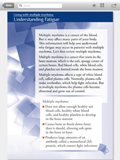 Celgene's Multiple Myeloma Resource Center
Celgene's Multiple Myeloma Resource Center
Celgene ($CELG) is heavily dependent on the multiple myeloma market. Last year Revlimid, one of its multiple myeloma treatments, accounted for two-thirds of company sales, and Celgene started the year by winning approval for another drug in the field. It also introduced iPhone and iPad apps to support its products. The app helps nurses educate patients about living with multiple myeloma.
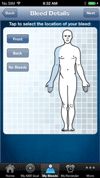 Baxter's Beat Bleeds
Baxter's Beat Bleeds
In June, Baxter won FDA approval for its hemophilia B drug Rixubis, but by then it had already been helping patients for months with its apps for Apple ($AAPL) and Android devices. The app offers many of the same features as Pfizer's ($PFE) HemMobile--which was launched within weeks of Beat Bleeds--and is designed to help hemophiliacs manage their condition.